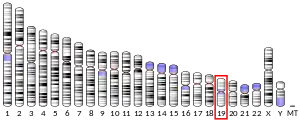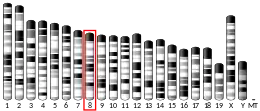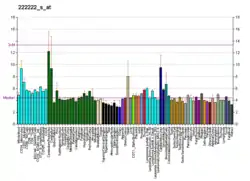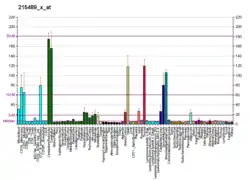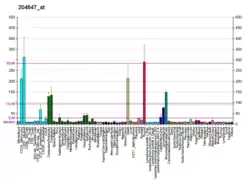HOMER3
Homer protein homolog 3 is a protein that in humans is encoded by the HOMER3 gene.[5][6][7]
| HOMER3 | |||||||||||||||||||||||||||||||||||||||||||||||||||
|---|---|---|---|---|---|---|---|---|---|---|---|---|---|---|---|---|---|---|---|---|---|---|---|---|---|---|---|---|---|---|---|---|---|---|---|---|---|---|---|---|---|---|---|---|---|---|---|---|---|---|---|
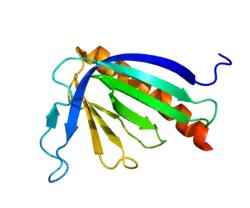 | |||||||||||||||||||||||||||||||||||||||||||||||||||
| |||||||||||||||||||||||||||||||||||||||||||||||||||
| Identifiers | |||||||||||||||||||||||||||||||||||||||||||||||||||
| Aliases | HOMER3, HOMER-3, VESL3, homer scaffolding protein 3, homer scaffold protein 3 | ||||||||||||||||||||||||||||||||||||||||||||||||||
| External IDs | OMIM: 604800 MGI: 1347359 HomoloGene: 37972 GeneCards: HOMER3 | ||||||||||||||||||||||||||||||||||||||||||||||||||
| |||||||||||||||||||||||||||||||||||||||||||||||||||
| |||||||||||||||||||||||||||||||||||||||||||||||||||
| |||||||||||||||||||||||||||||||||||||||||||||||||||
| |||||||||||||||||||||||||||||||||||||||||||||||||||
| |||||||||||||||||||||||||||||||||||||||||||||||||||
| Wikidata | |||||||||||||||||||||||||||||||||||||||||||||||||||
| |||||||||||||||||||||||||||||||||||||||||||||||||||
Function
This gene encodes a member of the homer family of dendritic proteins. Members of this family regulate group 1 metabotrophic glutamate receptor function. The encoded protein may be involved in cell growth.[7]
References
- GRCh38: Ensembl release 89: ENSG00000051128 - Ensembl, May 2017
- GRCm38: Ensembl release 89: ENSMUSG00000003573 - Ensembl, May 2017
- "Human PubMed Reference:". National Center for Biotechnology Information, U.S. National Library of Medicine.
- "Mouse PubMed Reference:". National Center for Biotechnology Information, U.S. National Library of Medicine.
- Soloviev MM, Ciruela F, Chan WY, McIlhinney RA (Feb 2000). "Molecular characterisation of two structurally distinct groups of human homers, generated by extensive alternative splicing". Journal of Molecular Biology. 295 (5): 1185–200. doi:10.1006/jmbi.1999.3436. PMID 10653696.
- Tu JC, Xiao B, Yuan JP, Lanahan AA, Leoffert K, Li M, Linden DJ, Worley PF (Oct 1998). "Homer binds a novel proline-rich motif and links group 1 metabotropic glutamate receptors with IP3 receptors". Neuron. 21 (4): 717–26. doi:10.1016/S0896-6273(00)80589-9. PMID 9808459. S2CID 2851554.
- "Entrez Gene: HOMER3 homer homolog 3 (Drosophila)".
- Yuan JP, Kiselyov K, Shin DM, Chen J, Shcheynikov N, Kang SH, Dehoff MH, Schwarz MK, Seeburg PH, Muallem S, Worley PF (Sep 2003). "Homer binds TRPC family channels and is required for gating of TRPC1 by IP3 receptors". Cell. 114 (6): 777–89. doi:10.1016/S0092-8674(03)00716-5. PMID 14505576. S2CID 10552676.
- Feng W, Tu J, Yang T, Vernon PS, Allen PD, Worley PF, Pessah IN (Nov 2002). "Homer regulates gain of ryanodine receptor type 1 channel complex". The Journal of Biological Chemistry. 277 (47): 44722–30. doi:10.1074/jbc.M207675200. PMID 12223488.
Further reading
- Brakeman PR, Lanahan AA, O'Brien R, Roche K, Barnes CA, Huganir RL, Worley PF (Mar 1997). "Homer: a protein that selectively binds metabotropic glutamate receptors". Nature. 386 (6622): 284–8. doi:10.1038/386284a0. PMID 9069287. S2CID 4346579.
- Xiao B, Tu JC, Petralia RS, Yuan JP, Doan A, Breder CD, Ruggiero A, Lanahan AA, Wenthold RJ, Worley PF (Oct 1998). "Homer regulates the association of group 1 metabotropic glutamate receptors with multivalent complexes of homer-related, synaptic proteins". Neuron. 21 (4): 707–16. doi:10.1016/S0896-6273(00)80588-7. PMID 9808458. S2CID 16431031.
- Feng W, Tu J, Yang T, Vernon PS, Allen PD, Worley PF, Pessah IN (Nov 2002). "Homer regulates gain of ryanodine receptor type 1 channel complex". The Journal of Biological Chemistry. 277 (47): 44722–30. doi:10.1074/jbc.M207675200. PMID 12223488.
- Yuan JP, Kiselyov K, Shin DM, Chen J, Shcheynikov N, Kang SH, Dehoff MH, Schwarz MK, Seeburg PH, Muallem S, Worley PF (Sep 2003). "Homer binds TRPC family channels and is required for gating of TRPC1 by IP3 receptors". Cell. 114 (6): 777–89. doi:10.1016/S0092-8674(03)00716-5. PMID 14505576. S2CID 10552676.
- Ishiguro K, Xavier R (Mar 2004). "Homer-3 regulates activation of serum response element in T cells via its EVH1 domain". Blood. 103 (6): 2248–56. doi:10.1182/blood-2003-08-2671. PMID 14645007.
- Cooper ST, Hanson IM (2006). "A screen for proteins that interact with PAX6: C-terminal mutations disrupt interaction with HOMER3, DNCL1 and TRIM11". BMC Genetics. 6: 43. doi:10.1186/1471-2156-6-43. PMC 1208879. PMID 16098226.
- Schreiner D, Müller K, Hofer HW (Oct 2006). "The intracellular domain of the human protocadherin hFat1 interacts with Homer signalling scaffolding proteins". FEBS Letters. 580 (22): 5295–300. doi:10.1016/j.febslet.2006.08.079. PMID 16979624. S2CID 10267922.
This article is issued from Wikipedia. The text is licensed under Creative Commons - Attribution - Sharealike. Additional terms may apply for the media files.
